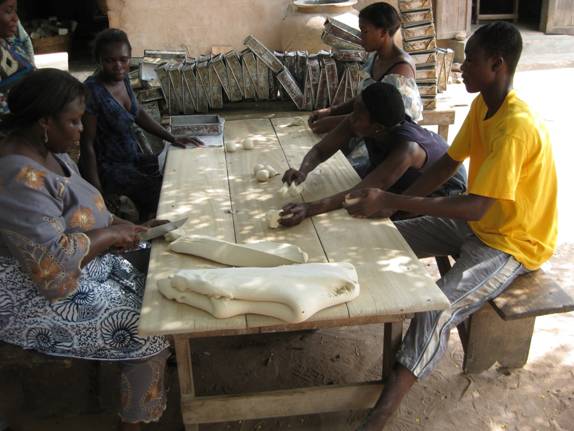The Secret to Successful Aid
…is that there is no secret. One approach to a successful aid project just is to immerse yourself in the local community, put local people in charge who are themselves highly motivated, be adaptive and flexible to respond to whatever the local people think about how they can help themselves, so that you customize the “standard project designs” to fit local circumstances. Most aid projects fail because there is nobody in the field making all these necessary adaptations and fixing unanticipated problems as they arise. The moral of the story is: be a Searcher and not a Planner.
All of these generalities came to mind when I visited the project Women’s Trust in Pokuase, Ghana yesterday, which I had also visited two years ago. I had a favorable impression then, and even more yesterday. An American, Dana Dakin, decided to start an NGO to help poor women on the occasion of her turning 60. The result, Women’s Trust, is a micro-credit initiative just for the medium-sized town of Pokuase on the outskirts of Accra. It seeks out female entrepreneurs and backs them with its small loans (the initial loan is less than $50, then increases with successive loans). The permanent staff is Ghanaian, led by the formidable Gertrude Ankrah, including accountants, loan officers, and computer whiz kids.
One success story is Sarah Ankrah (Ankrah is a very common name here), who received a 3000 Ghanaian cedi loan (at the time 1 cedi was equal to 1 dollar). Sarah now runs the largest bakery in Pokuase. Every day she gets up at 2am to go through 8 large bags of flour to have bread ready for her customers first thing in the morning. Women’s Trust microloans allowed her to grow by avoiding the extortionate rates charged by the flour suppliers (a 9% interest rate for a loan of only 2 weeks), which had previously eaten away most of her profits. Now she employs 8 women and 4 men. Her son Sammy became the first member of the family to go to college. Sarah perceives her market as “unlimited,” and is dreaming now of buying a delivery van to scatter her loaves far and wide. She repaid the 3000 loan and took out a new loan from Women’s Trust of 4000.

Sarah Ankrah and her workers cut up and shape the dough.
Similar success stories abound. Women’s Trust has diversified into new areas as opportunities arise. Bright kids from Pokuase whose school careers and life prospects would have ended prematurely get scholarships. Mothers bring in their babies to Women’s Trust to be weighed as a check on good nutrition. A handicraft operation crochets strips of plastic from recycled garbage bags into colorful handbags (two large orders from the US have already been received).
This kind of aid project is based on a lot of personal, face to face interaction, developing trust and a shared vision, so it is small scale, it has to let things proceed at their own pace, it can’t meet rigid pre-set output targets, it could never be judged by a rigorous “randomized controlled trial” methodology. In short, it involves the kind of tacit knowledge and individual adaptation that could never be converted into a routinized project implemented by the official aid bureaucracies. It breaks all the rules, and it works.
 From Aid to Equality
From Aid to Equality
